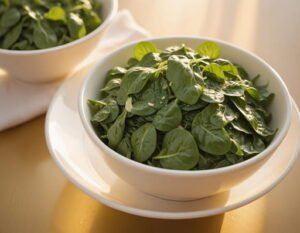The Spinach Diet: A Green Path to Weight Loss
When it comes to weight loss, finding the right diet can be overwhelming. Among the myriad of options available, the Spinach Diet stands out as a simple, nutritious, and effective way to shed pounds while boosting overall health. Spinach, often hailed as a superfood, is packed with essential nutrients that can support weight loss, making it an excellent addition to your diet plan.
 Why Spinach?
Why Spinach?
Spinach is often celebrated for its health benefits, but when it comes to weight loss, this leafy green is a true game-changer. Not only is it incredibly low in calories, but it also offers a wide array of essential nutrients that can support your weight loss journey while keeping your body nourished. Let’s delve deeper into why spinach is such a fantastic choice for anyone looking to lose weight and improve their overall health.
Low in Calories, High in Volume
One of the most challenging aspects of dieting is managing hunger and avoiding overeating. Spinach addresses this issue beautifully because it is extremely low in calories while being high in volume. A 100-gram serving of spinach contains only 23 calories, meaning you can eat generous portions without significantly impacting your daily calorie intake.
The bulkiness of spinach helps fill your stomach, creating a sense of fullness. This can reduce the temptation to indulge in unhealthy snacks or overeat during meals. By incorporating spinach into your meals, you can enjoy a substantial serving size that satisfies your appetite while still adhering to a calorie-controlled diet.
 High in Fiber: The Key to Satiety and Digestive Health
High in Fiber: The Key to Satiety and Digestive Health
Dietary fiber is a crucial component of any weight loss plan, and spinach is an excellent source of it. Fiber slows down the digestion process, which helps you feel full for a longer period after eating. This prolonged feeling of fullness is essential in curbing hunger pangs and reducing the likelihood of snacking between meals.
Moreover, fiber plays a critical role in maintaining digestive health. It adds bulk to your stool and promotes regular bowel movements, which is vital for preventing constipation, a common issue in restrictive diets. A healthy digestive system also ensures that your body effectively absorbs nutrients, which is especially important when you’re cutting calories.
In addition, fiber helps regulate blood sugar levels by slowing the absorption of sugar into your bloodstream. This is particularly beneficial for those looking to lose weight, as stable blood sugar levels can help prevent insulin spikes, which often lead to fat storage and cravings for sugary foods.
Rich in Nutrients: A Nutritional Safety Net
One of the risks of weight loss diets is that they can sometimes lead to nutrient deficiencies if not carefully managed. However, spinach is a nutrient-dense food that can help you avoid this pitfall. Despite its low-calorie content, spinach is packed with a wide range of vitamins and minerals that are essential for maintaining overall health.
Vitamin A: Spinach is an excellent source of beta-carotene, which your body converts into vitamin A. This vitamin is crucial for maintaining healthy vision, skin, and immune function. In the context of weight loss, vitamin A also supports healthy metabolism, ensuring that your body efficiently converts food into energy.
Vitamin C: Known for its immune-boosting properties, vitamin C is also a powerful antioxidant that helps protect your cells from oxidative stress. This is important during weight loss, as oxidative stress can be a byproduct of fat breakdown. Additionally, vitamin C aids in the absorption of iron from plant-based sources like spinach, enhancing its overall nutritional value.
Vitamin K: Spinach is one of the richest sources of vitamin K, which is vital for blood clotting and bone health. Maintaining strong bones is essential when losing weight, as rapid weight loss can sometimes lead to bone density loss. Vitamin K also works in synergy with calcium to strengthen your bones and support your overall skeletal health.
Iron: Spinach is well-known for its iron content, which is especially important for those on a calorie-restricted diet. Iron plays a critical role in energy production and preventing fatigue. When you’re cutting calories, it’s essential to maintain your energy levels, and spinach can help you do just that by ensuring you get enough iron.
Magnesium: This mineral is involved in over 300 biochemical reactions in your body, including energy production, muscle function, and nerve signaling. Magnesium also helps regulate blood sugar levels, which is important for maintaining steady energy levels and preventing cravings.
 Antioxidant Power: Protecting Your Body During Weight Loss
Antioxidant Power: Protecting Your Body During Weight Loss
Spinach is rich in antioxidants, compounds that neutralize free radicals in your body. Free radicals are unstable molecules that can damage your cells, leading to inflammation and various chronic diseases. Weight loss, especially when achieved through exercise, can increase the production of free radicals, making antioxidants even more critical.
Lutein and Zeaxanthin: These two antioxidants are particularly abundant in spinach and are known for their role in eye health. They protect your eyes from damage caused by blue light and oxidative stress. However, their benefits extend beyond just vision; these antioxidants also help reduce inflammation throughout your body, which is often linked to obesity and weight gain.
Flavonoids and Polyphenols: Spinach contains a range of flavonoids and polyphenols, which are plant compounds with potent anti-inflammatory and antioxidant effects. These compounds help protect your cells from damage, support heart health, and may even have anti-cancer properties. During weight loss, these antioxidants can help your body cope with the increased oxidative stress that often accompanies fat breakdown.
Spinach and Weight Loss: The Science Behind It
Several studies support the idea that incorporating spinach into your diet can aid in weight loss. For example, research has shown that the thylakoids in spinach—a type of compound found in green plants—can reduce hunger and cravings. Thylakoids slow down the digestion of fat, leading to a more gradual release of energy and a longer-lasting feeling of fullness. This can be particularly helpful in reducing cravings for unhealthy, high-calorie foods.
Furthermore, the high water content of spinach (about 91%) adds to its ability to promote satiety without adding calories. Foods with high water content are known to be more filling, helping you consume fewer calories overall.
 The Spinach Diet Plan
The Spinach Diet Plan
Incorporating spinach into your diet doesn’t just have to be about eating salads or having it as a side dish. Spinach is incredibly versatile and can be incorporated into a wide variety of meals throughout the day. Below is a detailed plan to help you incorporate spinach into every meal, ensuring that you reap all the benefits of this superfood while sticking to your weight loss goals.
Breakfast: Spinach Smoothie
Starting your day with a spinach smoothie is a fantastic way to pack in nutrients right from the get-go. Spinach blends seamlessly with other ingredients, making it a perfect base for a morning smoothie.
Ingredients:
- A handful of fresh spinach leaves
- 1 medium banana (for natural sweetness)
- 1 cup of unsweetened almond milk (low in calories and adds creaminess)
- 1 tablespoon of chia seeds (rich in omega-3 fatty acids and fiber)
- Optional: A scoop of protein powder (for an extra protein boost)
Method: Blend all the ingredients until smooth. This smoothie not only provides a burst of energy but also keeps you full until your next meal due to the fiber content from spinach and chia seeds. The banana adds a natural sweetness that balances out the slight bitterness of spinach, making it palatable even for those who aren’t big fans of leafy greens.
Nutritional Benefits: This smoothie offers a perfect blend of macronutrients and micronutrients. The combination of fiber and protein helps keep hunger at bay, while the potassium from the banana aids in electrolyte balance, especially important if you exercise in the morning.
Lunch: Spinach Salad
A spinach salad at lunch is an easy way to keep your meal light, yet filling. By adding lean protein and healthy fats, you create a well-rounded meal that supports muscle maintenance and keeps you satisfied.
Ingredients:
- 2 cups of fresh spinach leaves
- 100-150 grams of grilled chicken breast (or tofu for a vegetarian option)
- 1/2 cup cherry tomatoes (rich in antioxidants)
- 1/4 cucumber (adds hydration and crunch)
- 1/2 avocado (provides healthy fats that help you stay full)
- 1 tablespoon of sunflower seeds (for crunch and additional healthy fats)
- Light vinaigrette dressing (made with olive oil, lemon juice, and a pinch of salt and pepper)
Method: Toss all the ingredients together in a large bowl. The grilled chicken provides the necessary protein to fuel your muscles, while the avocado adds creaminess and healthy fats that help absorb fat-soluble vitamins from the spinach.
Nutritional Benefits: This salad is rich in vitamins A and C, antioxidants, and fiber. The lean protein from chicken or tofu supports metabolism and muscle maintenance, while the healthy fats from avocado ensure you feel full and satisfied. The sunflower seeds add a pleasant crunch while offering vitamin E, which is great for skin health.
Snack: Spinach and Greek Yogurt Dip
For a midday snack that’s both healthy and delicious, a spinach and Greek yogurt dip is a great option. It’s easy to prepare and can be paired with a variety of crunchy vegetables.
Ingredients:
- 1 cup Greek yogurt (high in protein and probiotics)
- 1/2 cup finely chopped spinach (fresh or thawed from frozen)
- 1 clove garlic, minced (adds flavor and boosts immunity)
- Salt and pepper to taste
- Optional: A squeeze of lemon juice (for added freshness)
Method: Mix the spinach, garlic, salt, and pepper into the Greek yogurt until well combined. Serve with carrot or cucumber sticks, whole-grain crackers, or bell pepper slices for added crunch.
Nutritional Benefits: This dip is a protein-rich snack that helps keep you full between meals. Greek yogurt is packed with probiotics, which promote gut health, while spinach adds fiber and a range of vitamins and minerals. Garlic not only enhances the flavor but also offers immune-boosting properties.
Dinner: Spinach and Quinoa Stir-Fry
Dinner is the perfect time to enjoy a warm, satisfying meal that’s still light and healthy. A spinach and quinoa stir-fry offers a perfect balance of complex carbohydrates, proteins, and vegetables.
Ingredients:
- 1 cup cooked quinoa (a complete protein and gluten-free grain)
- 2 cups fresh spinach leaves
- 1 small onion, diced (adds flavor and antioxidants)
- 1 cup mushrooms, sliced (low in calories, high in nutrients)
- 2 cloves garlic, minced
- 1 tablespoon olive oil (for sautéing and added healthy fats)
- 100 grams of grilled fish or tofu (for lean protein)
- Salt and pepper to taste
Method: Heat olive oil in a pan and sauté the onions and garlic until soft. Add the mushrooms and cook until they release their moisture. Toss in the spinach and cook until wilted. Finally, mix in the cooked quinoa and season with salt and pepper. Serve with grilled fish or tofu on the side.
Nutritional Benefits: Quinoa is a nutrient-dense grain that’s high in protein and fiber, making it an excellent choice for dinner. Paired with spinach and other vegetables, this dish provides a variety of essential nutrients without being too heavy. The grilled fish or tofu adds lean protein, which is crucial for muscle repair and recovery, especially if you’re exercising regularly.
Evening Snack: Spinach Chips
For those late-night cravings, spinach chips are a guilt-free option that satisfies your need for something crunchy without adding unnecessary calories.
Ingredients:
- Fresh spinach leaves
- 1 tablespoon olive oil (for coating)
- A pinch of sea salt (or other seasonings like garlic powder or paprika)
Method: Preheat your oven to 325°F (160°C). Toss the spinach leaves in olive oil and spread them in a single layer on a baking sheet. Sprinkle with sea salt and bake for 10-15 minutes, or until the leaves are crispy but not burnt.
Nutritional Benefits: Spinach chips are a low-calorie snack that allows you to indulge without guilt. They’re rich in vitamins A and C and provide a satisfying crunch, making them a great alternative to high-calorie potato chips or other processed snacks.
 Additional Tips for the Spinach Diet
Additional Tips for the Spinach Diet
To make the most of the Spinach Diet, here are a few extra tips:
- Spice It Up: Don’t be afraid to add herbs and spices to your spinach dishes. Flavors like garlic, ginger, and black pepper not only enhance the taste but also provide additional health benefits.
- Try Different Forms: Experiment with different forms of spinach—fresh, frozen, or even baby spinach, which is milder in flavor. Each variety can be used in different ways, so you don’t get bored with your meals.
- Prep in Advance: Pre-wash and store spinach in the fridge to make it easier to incorporate into your meals. This can save time and ensure you always have spinach ready to go.
By following this detailed Spinach Diet Plan, you’ll not only support your weight loss efforts but also provide your body with a rich array of nutrients that promote overall health. With creativity and variety in your meals, sticking to this diet can be enjoyable and sustainable in the long run.
Benefits Beyond Weight Loss: The Broader Health Impact of Spinach
While the primary focus of the Spinach Diet is weight loss, spinach offers a wealth of health benefits that extend far beyond just shedding pounds. Regular consumption of this nutrient-dense green can improve multiple aspects of your health, making it a valuable addition to your diet even after you’ve reached your weight loss goals.
1. Improved Digestion
One of the most significant benefits of spinach is its high fiber content. Dietary fiber is crucial for maintaining a healthy digestive system. Here’s how spinach supports digestion:
- Promotes Regularity: The insoluble fiber in spinach adds bulk to the stool, making it easier to pass through the digestive tract. This helps prevent constipation, a common issue when following low-calorie diets.
- Supports Gut Health: Spinach acts as a prebiotic, feeding the good bacteria in your gut. A healthy gut microbiome is essential for overall digestion and can also influence weight management, mood, and immune function.
- Eases Irritable Bowel Symptoms: The magnesium in spinach can help relax the muscles of the digestive tract, reducing symptoms like cramping and bloating that are associated with conditions such as irritable bowel syndrome (IBS).
By incorporating spinach into your diet regularly, you can enhance your digestive health, ensuring your body efficiently processes and absorbs nutrients.
2. Enhanced Skin Health
Spinach’s nutrient profile also plays a significant role in maintaining and improving skin health. Here’s how:
- Antioxidant Protection: Spinach is rich in antioxidants like vitamins A and C, as well as beta-carotene, which protect your skin from oxidative stress caused by free radicals. This oxidative stress can lead to premature aging, wrinkles, and skin damage.
- Hydration: The high water content in spinach helps keep your skin hydrated from the inside out, promoting a smooth and supple appearance.
- Healing and Repair: Vitamin C in spinach is essential for collagen production, a protein that helps maintain skin elasticity and promotes faster healing of wounds and scars. Regular consumption of spinach can result in a clearer, more radiant complexion.
- Anti-Inflammatory Properties: Spinach’s natural anti-inflammatory compounds, such as lutein, help soothe irritated skin and may reduce redness and acne breakouts.
Adding spinach to your diet can lead to glowing, youthful skin, making it a natural beauty enhancer.
3. Stronger Bones
Bone health is a critical aspect of overall well-being, and spinach is a powerful ally in maintaining strong bones. Here’s how spinach contributes:
- High in Vitamin K: Spinach is one of the richest plant-based sources of vitamin K, which plays a crucial role in bone mineralization. Vitamin K helps regulate calcium, ensuring it is effectively absorbed into your bones, reducing the risk of fractures and osteoporosis.
- Calcium Content: While spinach is not the highest source of calcium compared to dairy products, it does provide a significant amount. This calcium, combined with vitamin K, supports bone density and strength.
- Magnesium and Phosphorus: Spinach also contains magnesium and phosphorus, both of which are essential minerals for bone formation and maintenance. Magnesium helps convert vitamin D into its active form, which is necessary for calcium absorption.
By regularly consuming spinach, you can support your bone health, reducing the risk of bone-related issues as you age.
4. Better Heart Health
Spinach’s impact on cardiovascular health is profound, making it an excellent food for heart health. Here’s how it helps:
- Nitrates for Blood Pressure: Spinach is rich in nitrates, which are converted into nitric oxide in the body. Nitric oxide helps relax blood vessels, improving blood flow and lowering blood pressure. This can reduce the risk of hypertension, heart attacks, and strokes.
- Lowers Cholesterol: The antioxidants in spinach, particularly lutein, can help reduce levels of bad cholesterol (LDL) in the blood. High LDL levels are associated with the buildup of plaque in arteries, leading to atherosclerosis and increasing the risk of heart disease.
- Rich in Folate: Spinach is an excellent source of folate (vitamin B9), which plays a role in reducing homocysteine levels in the blood. Elevated homocysteine is linked to an increased risk of heart disease, so consuming spinach can help protect your heart.
- Potassium for Heart Function: The potassium in spinach supports heart health by helping to regulate blood pressure and fluid balance in the body. Potassium counteracts the effects of sodium, which can lead to high blood pressure and heart strain.
Incorporating spinach into your diet can significantly reduce the risk of cardiovascular diseases and promote a healthier heart.
5. Boosted Immunity
A strong immune system is essential for preventing illness and maintaining overall health. Spinach can help boost your immune defenses in several ways:
- High in Vitamin C: Spinach’s high vitamin C content plays a vital role in immune function. Vitamin C stimulates the production of white blood cells, which are essential for fighting off infections. It also acts as an antioxidant, protecting immune cells from damage by free radicals.
- Beta-Carotene and Vitamin A: Spinach contains beta-carotene, which the body converts into vitamin A. This vitamin is crucial for maintaining the health of mucous membranes in the respiratory, digestive, and urinary tracts, serving as the body’s first line of defense against pathogens.
- Anti-Inflammatory Properties: Chronic inflammation can weaken the immune system. Spinach’s anti-inflammatory compounds help reduce inflammation in the body, supporting overall immune health.
- Iron and Energy: Spinach is also a good source of iron, which is essential for maintaining energy levels. Low iron levels can lead to fatigue and weaken the immune system, making it harder for the body to fight off infections.
 Tips for Success on the Spinach Diet
Tips for Success on the Spinach Diet
To maximize the effectiveness of the Spinach Diet, it’s important to incorporate some key strategies that will help you achieve your weight loss goals and maintain a healthy lifestyle. Below are detailed tips that can enhance your success on this diet:
1. Stay Hydrated
Water plays a crucial role in any weight loss journey, and the Spinach Diet is no exception. Staying hydrated is essential for several reasons:
Boosts Metabolism: Drinking water can temporarily increase your metabolism, helping you burn more calories throughout the day. Studies show that drinking water can increase calorie burning by 24-30% for 1.5 hours after consumption.
Reduces Appetite: Sometimes, thirst is mistaken for hunger. By staying hydrated, you can prevent unnecessary snacking and overeating. Drinking a glass of water before meals can also help you feel fuller, reducing the amount of food you eat.
Flushes Out Toxins: Water helps flush toxins and waste products from your body, which is especially important when you’re losing weight. This can improve digestion, reduce bloating, and help your body function more efficiently.
Supports Skin Health: Adequate hydration is crucial for maintaining healthy, glowing skin. As you lose weight, staying hydrated can also help prevent sagging skin by improving elasticity.
To ensure you’re drinking enough water, aim for at least 8 glasses (2 liters) a day. You can also include herbal teas and water-rich foods like cucumbers and watermelon in your diet to stay hydrated.
2. Exercise Regularly
Exercise is a powerful tool that complements the Spinach Diet, accelerating your weight loss and improving your overall fitness. Here’s how to incorporate it effectively:
Cardio Workouts: Activities like running, cycling, swimming, or brisk walking can burn a significant amount of calories and help you shed fat. Aim for at least 150 minutes of moderate-intensity cardio per week, or 75 minutes of vigorous-intensity exercise.
Strength Training: Building lean muscle through strength training exercises (like weight lifting, resistance bands, or bodyweight exercises) not only tones your body but also boosts your metabolism. Muscle tissue burns more calories at rest compared to fat tissue, so increasing your muscle mass helps you burn more calories even when you’re not exercising.
Flexibility and Balance: Incorporating activities like yoga or Pilates can improve your flexibility and balance, reduce stress, and prevent injuries. These low-impact exercises can also enhance your mental well-being, making it easier to stick to your diet plan.
Consistency is Key: To see real results, consistency is vital. Create a workout routine that you enjoy and can stick to in the long term. Start with small, achievable goals and gradually increase the intensity and duration of your workouts as your fitness improves.
3. Monitor Portions
While spinach is a low-calorie food, it’s important to be mindful of portion sizes for the other foods in your diet. Portion control helps prevent overeating and ensures that you stay within your calorie limits for weight loss.
Use Smaller Plates: Eating from a smaller plate can make your portions appear larger, which can trick your brain into feeling more satisfied with less food. This is a simple yet effective way to control your calorie intake without feeling deprived.
Mindful Eating: Pay attention to your hunger and fullness cues. Eat slowly, savor each bite, and stop eating when you’re satisfied, not stuffed. Mindful eating can help you avoid overeating and make more conscious food choices.
Plan Your Meals: Meal planning is a great way to control portions and avoid impulsive eating. Prepare your meals in advance and portion them out in containers, so you’re not tempted to eat more than you need.
Read Labels: Be mindful of serving sizes and calories when eating packaged foods. Even healthy snacks like nuts or dried fruit can add up quickly if you’re not careful with portions.
4. Variety is Key
While spinach is the star of this diet, it’s important not to rely solely on this leafy green. A balanced and varied diet ensures that you get all the essential nutrients your body needs to function optimally. Here’s how to add variety to your diet:
Incorporate Other Vegetables: Along with spinach, include a wide range of colorful vegetables like bell peppers, broccoli, carrots, and sweet potatoes. These vegetables provide different vitamins, minerals, and antioxidants that spinach may lack. For example, bell peppers are rich in vitamin C, while sweet potatoes offer a good source of beta-carotene.
Include Lean Proteins: Protein is essential for muscle repair, immune function, and overall health. Incorporate lean protein sources like chicken, turkey, fish, tofu, eggs, and legumes. Protein also helps keep you full and satisfied, reducing the likelihood of overeating.
Don’t Forget Healthy Fats: Healthy fats, such as those found in avocados, nuts, seeds, and olive oil, are important for heart health and can help keep you feeling full. These fats also aid in the absorption of fat-soluble vitamins like A, D, E, and K, which are abundant in spinach.
Whole Grains for Energy: Whole grains like quinoa, brown rice, oats, and whole wheat provide fiber and sustained energy. They help stabilize blood sugar levels and keep you feeling full longer. Combine them with spinach-based dishes to create balanced meals.
Experiment with Spices and Herbs: To keep your meals interesting and flavorful, use a variety of spices and herbs. Spices like turmeric, cumin, and paprika not only add taste but also offer health benefits, such as reducing inflammation and boosting metabolism.
5. Manage Stress and Get Enough Sleep
While not directly related to diet, managing stress and getting enough sleep are critical components of successful weight loss.
Stress Management: High stress levels can lead to emotional eating and cravings for unhealthy foods. Incorporate stress-reducing activities into your routine, such as meditation, deep breathing exercises, or hobbies you enjoy.
Quality Sleep: Poor sleep can disrupt your hunger hormones, leading to increased appetite and cravings for high-calorie foods. Aim for 7-9 hours of quality sleep each night to support your weight loss efforts. Establish a regular sleep schedule and create a calming bedtime routine to improve your sleep quality.
Conclusion
The Spinach Diet is a simple yet effective way to lose weight while nourishing your body with essential nutrients. By incorporating spinach into your meals, you can enjoy its numerous health benefits while achieving your weight loss goals. Remember, the key to successful weight loss is consistency, so stick to your plan, stay active, and enjoy the journey to a healthier you!
Contraindications to the Spinach Diet
While the Spinach Diet offers numerous health benefits and can be an effective tool for weight loss, it is not suitable for everyone. There are certain health conditions and situations where consuming large amounts of spinach may pose risks. Below are some contraindications to consider before starting the Spinach Diet:
1. Kidney Stones
Spinach is high in oxalates, compounds that can contribute to the formation of kidney stones in susceptible individuals. Oxalates bind with calcium in the body to form calcium oxalate, which is the most common type of kidney stone. If you have a history of kidney stones or are prone to developing them, it’s important to limit your intake of high-oxalate foods like spinach.
Alternative Options: If you’re at risk for kidney stones but still want to follow a leafy green diet, consider low-oxalate alternatives such as kale or arugula.
2. Thyroid Issues
Spinach contains goitrogens, substances that can interfere with thyroid function by inhibiting the absorption of iodine. For individuals with thyroid conditions, especially hypothyroidism, consuming large amounts of raw spinach may exacerbate the issue.
Precaution: If you have thyroid problems, it’s best to cook spinach before eating it, as cooking can reduce the goitrogenic properties. However, it’s still wise to consume spinach in moderation and consult your healthcare provider before making it a staple in your diet.
3. Iron Overload (Hemochromatosis)
Spinach is a good source of non-heme iron, which is beneficial for those who need to boost their iron intake. However, for individuals with hemochromatosis, a condition that causes the body to absorb too much iron, consuming spinach in large quantities can contribute to iron overload. This can lead to complications such as liver damage, heart problems, and diabetes.
Consultation Recommended: If you have hemochromatosis or are concerned about iron levels, it’s important to monitor your iron intake and discuss your diet with a healthcare professional.
4. Blood Clotting Disorders and Anticoagulant Medication
Spinach is rich in vitamin K, a nutrient that plays a crucial role in blood clotting. While vitamin K is essential for health, consuming large amounts of spinach can interfere with anticoagulant (blood-thinning) medications such as warfarin. This is because vitamin K can counteract the effects of these medications, increasing the risk of blood clots.
Dietary Balance: If you are on blood-thinning medication, it’s important to maintain a consistent intake of vitamin K and avoid sudden changes in your consumption of spinach. Consult with your healthcare provider to determine the appropriate amount of spinach you can safely eat.
5. Allergies
Though rare, some individuals may have an allergic reaction to spinach. Symptoms of a spinach allergy can include itching, swelling, and digestive issues. In severe cases, an allergic reaction can lead to anaphylaxis, a life-threatening condition that requires immediate medical attention.
Avoidance: If you suspect you have a spinach allergy, it’s crucial to avoid the vegetable and seek guidance from an allergist for proper diagnosis and management.
6. Low Blood Pressure
Spinach is high in nitrates, which can help lower blood pressure by promoting the dilation of blood vessels. While this is beneficial for individuals with high blood pressure, those who already have low blood pressure (hypotension) may need to be cautious. Consuming large amounts of spinach could further lower blood pressure, leading to symptoms like dizziness, fainting, and fatigue.
Monitor Symptoms: If you have low blood pressure, monitor how your body reacts to spinach and consider moderating your intake. It’s also a good idea to discuss your diet with your healthcare provider.
7. Digestive Sensitivity
Spinach is high in fiber, which is beneficial for digestion but can cause problems for individuals with certain digestive conditions, such as irritable bowel syndrome (IBS). Eating large amounts of spinach may lead to bloating, gas, or discomfort in those with sensitive digestive systems.
Moderation: If you have a sensitive digestive system, try introducing spinach gradually into your diet and monitor how your body responds. Cooking spinach can also make it easier to digest.
To learn more about spinach, you can go to the page dedicated to spinach.
Click here if you want to see more articles from the diet category
Reference:
- Candida J. Rebello, Jessica Chu, Robbie Beyl, Dan Edwall – Acute Effects of a Spinach Extract Rich in Thylakoids on Satiety: A Randomized Controlled Crossover Trial – doi: 10.1080/07315724.2014.1003999
- Vijay Joshi, Arianne Penalosa, Madhumita Joshi, Sierra Rodriguez – Regulation of Oxalate Metabolism in Spinach Revealed by RNA-Seq-Based Transcriptomic Analysis – doi: 10.3390/ijms22105294
- Caroline Montelius, Daniel Erlandsson, Egzona Vitija, Eva-Lena Stenblom, Emil Egecioglu, Charlotte Erlanson-Albertsson – Body weight loss, reduced urge for palatable food and increased release of GLP-1 through daily supplementation with green-plant membranes for three months in overweight women – https://doi.org/10.1016/j.appet.2014.06.101
- James M. Lattimer , Mark D. Haub – Effects of Dietary Fiber and Its Components on Metabolic Health – doi: 10.3390/nu2121266

 Why Spinach?
Why Spinach?  High in Fiber: The Key to Satiety and Digestive Health
High in Fiber: The Key to Satiety and Digestive Health Antioxidant Power: Protecting Your Body During Weight Loss
Antioxidant Power: Protecting Your Body During Weight Loss The Spinach Diet Plan
The Spinach Diet Plan Additional Tips for the Spinach Diet
Additional Tips for the Spinach Diet Tips for Success on the Spinach Diet
Tips for Success on the Spinach Diet